 Last updated: February 2nd, 2023 7:28 PM
Last updated: February 2nd, 2023 7:28 PM
Step-by-Step Guide to Check AO Codes for Pan
AO Code stands for Assessing Officer code under whose jurisdiction that the applicant Income Tax Return (ITR) will fall. This AO code has to be mentioned in the form when applying for a new PAN card. AO code is necessary for Income Tax assessment as it denotes the tax laws applicable for a person and under whose jurisdiction will the assessment be covered. In this article, we look at the AO Code in detail.Components of AO Code
Assessing Officer is a person who is appointed by the Income Tax Department for the purpose of assessing the taxation of the people. Identification of these assessing officers done with the help of AO codes. Also, there is a table designed in Form 49A where AO codes can be identified. AO code consists of the four components, as mentioned below: Area Code: Area Code helps in the identification of the company or individual. AO Type: AO type helps the Income-tax department for the identification of the category of PAN cardholder, company, individual or service personnel or any person who is not the citizen of India. Range Type: Range type is based on to find the permanent address of PAN Cardholder. They are being assigned with a Range type which helps to identify the circle or ward that they reside. AO Number: AO number is a numerical value which is published on the website of NSDL and is the last element of AO code.Selection Criteria of AO code
Before making the selection of AO code, that one needs to understand the selection criteria based on which the AO code can be selected as given below:- In case of Individuals: If any individual applies for a new PAN card whose source of income from a salary or business then in such case, AO code will be either on the residential address or business address.
- In the case of Non-Individuals: Individuals refer to Trusts, Hindu Undivided Family (HUFs), Government bodies, limited liability partnership (LLP), companies etc. In such cases, the organisation will consider the business address for determining their AO code.
Different Types of AO code
There are four different types of AO codes designated for the identification of the company or individual. For the correct identification of AO coed, the National Securities Depository Limited (NSDL) has published the list of AO codes which is being separated into the following categories: International Taxation: These are AO codes for the person who is not a resident of India and applying for a PAN card or any company not incorporated in India is required to select this AO code. Non-International Taxation (Mumbai): These are AO code for the people and companies that are residing in Mumbai or registered in Mumbai. Non-International Taxation (Outside Mumbai): These are AO code for those individuals or companies that are based in India and outside of Mumbai. Defense Personnel: These are AO code for the identification of an individual who belongs to the Air Force or Indian Army. Under the category, there are only two forms of AO codes are meant for the Air Force and others for the Indian Army.Check AO code for PAN
To check AO code when applying for PAN card, follow the steps as specified below: Step 1: Vist National Securities Depository Limited (NSDL) portal to search the AO code. Step 2: Now, search for your city from the appropriate list of AO codes. [caption id="attachment_99324" align="aligncenter" width="904"]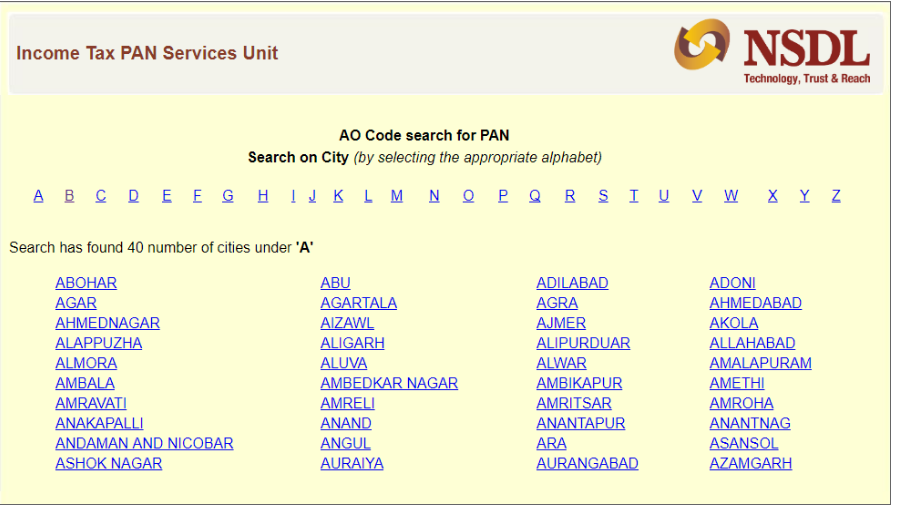 AO Code- AO Code search for PAN
Step 3: Once you identify the city, check for the section "Additional Description" to know if the selected area is a part of that AO code.
[caption id="attachment_99325" align="aligncenter" width="880"]
AO Code- AO Code search for PAN
Step 3: Once you identify the city, check for the section "Additional Description" to know if the selected area is a part of that AO code.
[caption id="attachment_99325" align="aligncenter" width="880"]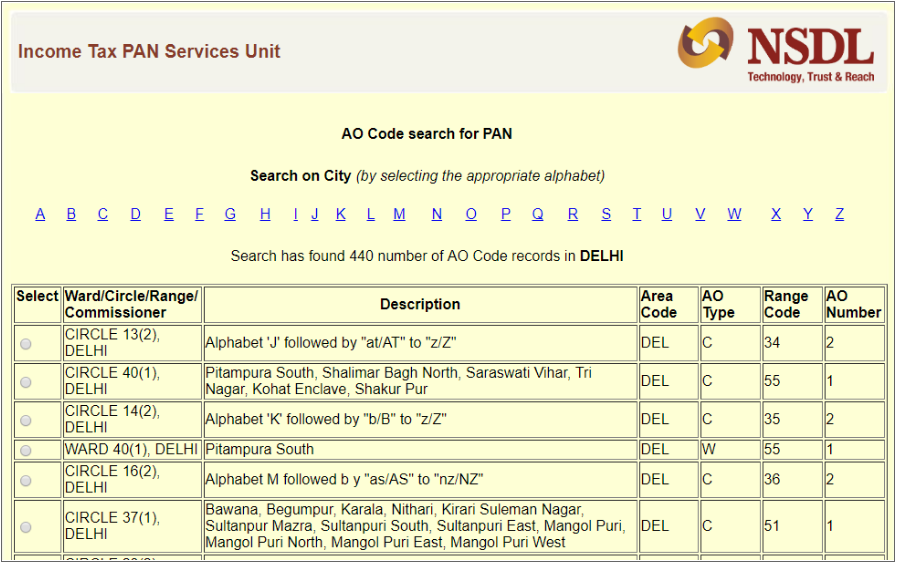 AO Code: Search on City
Step 4: One needs to check that the AO code applies to you in terms of company, individual or international entity.
Step 5: Once you would able to make the selection of right AO code, make a note of AO type, Range type, Area code, and AO number.
Step 6: After selecting the appropriate AO code, click on the Submit button.
AO Code: Search on City
Step 4: One needs to check that the AO code applies to you in terms of company, individual or international entity.
Step 5: Once you would able to make the selection of right AO code, make a note of AO type, Range type, Area code, and AO number.
Step 6: After selecting the appropriate AO code, click on the Submit button.
Know your Jurisdictional Assessing Officer
To know the Assessing Officer under whose jurisdiction income tax returns fall, follow the steps given below: Method-I Step 1: The applicant has to visit the home page of the income tax filing website to view the income tax ward or circle. Step 2: Log in to the e-filing tax account by entering PAN details and registered mobile number. [caption id="attachment_99326" align="aligncenter" width="922"] AO Code: Know Your Jurisdiction
Step 3: On entering the details correctly, click on the "Submit" button to receive "One Time Password" (OTP) on the registered mobile number.
Step 4: Now, enter the OTP and validate the process to view your jurisdiction.
[caption id="attachment_99328" align="aligncenter" width="910"]
AO Code: Know Your Jurisdiction
Step 3: On entering the details correctly, click on the "Submit" button to receive "One Time Password" (OTP) on the registered mobile number.
Step 4: Now, enter the OTP and validate the process to view your jurisdiction.
[caption id="attachment_99328" align="aligncenter" width="910"] AO Code: View your jurisdiction
Step 5: Now, the applicant will be directed to a page "Know your Jurisdictional Assessing Officer (AO) where you check your area code, AO type, Range Code, AO number, jurisdiction's address, and the email ID.
[caption id="attachment_99329" align="aligncenter" width="936"]
AO Code: View your jurisdiction
Step 5: Now, the applicant will be directed to a page "Know your Jurisdictional Assessing Officer (AO) where you check your area code, AO type, Range Code, AO number, jurisdiction's address, and the email ID.
[caption id="attachment_99329" align="aligncenter" width="936"]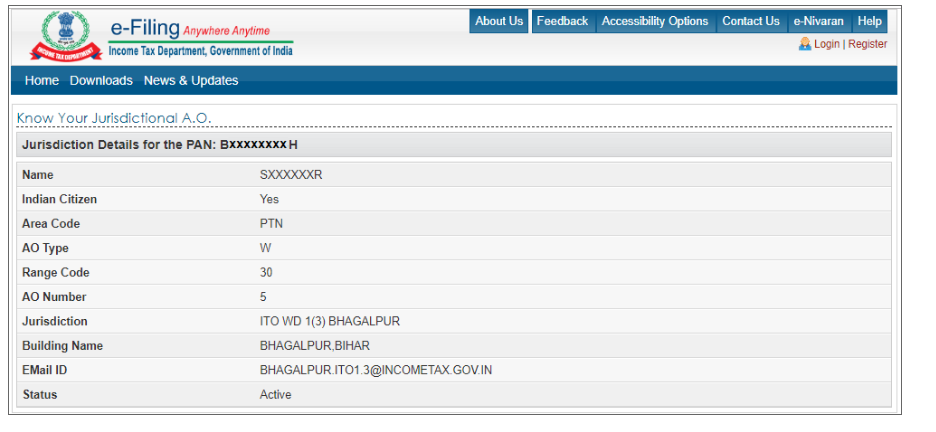 AO Code: Jurisdictional AO details
Method-II
Step 1: Revisit the same portal and login with your e-filling tax account by entering PAN details, password and captcha code.
[caption id="attachment_99330" align="aligncenter" width="670"]
AO Code: Jurisdictional AO details
Method-II
Step 1: Revisit the same portal and login with your e-filling tax account by entering PAN details, password and captcha code.
[caption id="attachment_99330" align="aligncenter" width="670"]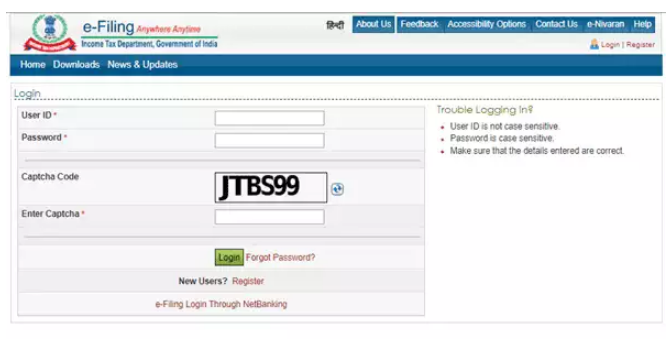 AO Code: Login Details
Step 2: After logging in to the portal, click on "Profile Settings" tab and select "My profile" option where you will find contact details. Further click on the "PAN Details" tab.
[caption id="attachment_99331" align="aligncenter" width="677"]
AO Code: Login Details
Step 2: After logging in to the portal, click on "Profile Settings" tab and select "My profile" option where you will find contact details. Further click on the "PAN Details" tab.
[caption id="attachment_99331" align="aligncenter" width="677"]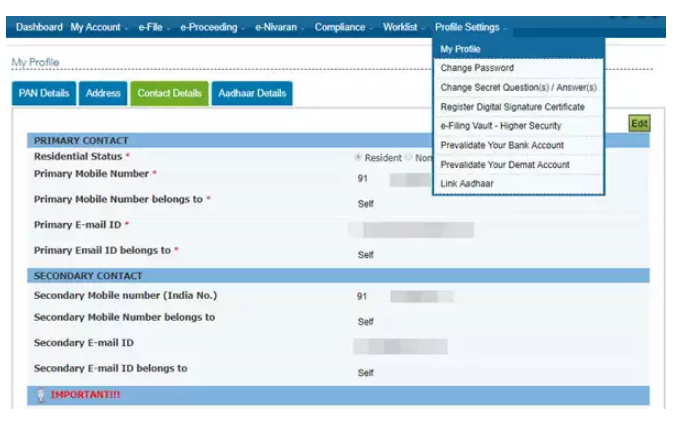 AO Code: Profile Settings
Step 3: After clicking the PAN details tab from that, you can view the "Jurisdiction Details" and also can view your income tax ward or circle.
[caption id="attachment_99333" align="aligncenter" width="677"]
AO Code: Profile Settings
Step 3: After clicking the PAN details tab from that, you can view the "Jurisdiction Details" and also can view your income tax ward or circle.
[caption id="attachment_99333" align="aligncenter" width="677"]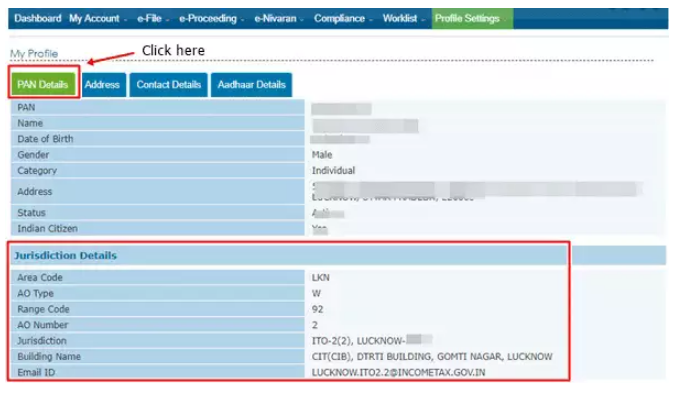 AO Code: View Jurisdiction Details
AO Code: View Jurisdiction Details
Popular Post

In the digital age, the convenience of accessing important documents online has become a necessity...

The Atalji Janasnehi Kendra Project that has been launched by the Government of Karnataka...

The Indian Divorce Act governs divorce among the Christian couples in India. Divorce...

When an individual has more than a single PAN card, it may lead to that person being heavily penalised, or worse,...

Employees Provident Fund (PF) is social security and savings scheme for employee in India. Employers engaged...


